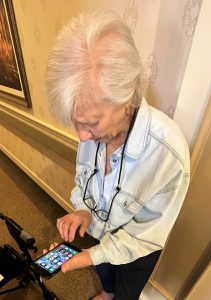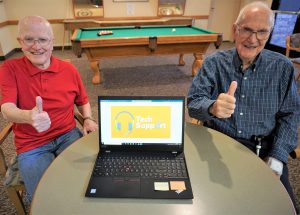
Today, your smartphone or tablet is much more than a phone – it is a mini-computer capable of doing almost as much as a regular computer. A source of connection for many seniors, these powerful devices have become prominent in our everyday lives. They keep us connected with friends and family and can provide pastimes such as games, social media, and photo sharing.
However, as with most technology, along with all the benefits come some risks. Meaning that smartphones should be used … well, smartly.
Why Is Smartphone Security Important for Seniors?
As mobile technology becomes more advanced, so do the methods that scammers use to take advantage of others. With so many people connected online, mobile device security is more vital than ever, particularly for seniors.
An AGE-WELL poll conducted by Environics Research in July 2020 shows that two-thirds (65%) of Canadians aged 65 and older now own a smartphone, and most who own one (83%) use it daily.
Unfortunately, older adults are heavily targeted by scammers. Common factors like social isolation and age-related changes in the brain can make some seniors more vulnerable to financial exploitation.
How to Secure Your Mobile Devices
 Attractive gateways for scam callers, robocalls, pranksters, and thieves, understanding the basics and best practices of smartphone safely is essential. And luckily pretty easy to learn. If you are a new smartphone user or know someone who is, learn how to master it with these smartphone tips for seniors.
Attractive gateways for scam callers, robocalls, pranksters, and thieves, understanding the basics and best practices of smartphone safely is essential. And luckily pretty easy to learn. If you are a new smartphone user or know someone who is, learn how to master it with these smartphone tips for seniors.
1. Start with the basics & simplify your smartphone for easy use.
As soon as you buy or receive a smart device like a phone or tablet, learn how to use the phone properly.
The first thing that older adult users of iPhones and Android phones should know is that each has a unique way of doing things. Both have features like increasing text size for better readability, enlarging the keyboard, and even audio descriptions.
If you aren’t Tech-savvy, ask a trusted family member or friend to help you feel comfortable trying to make the changes yourself, or try these step-by-step instructions from Green Smartphones.
2. Use a pin, password or pattern to lock your phone.
Make your cellphone password-protected! Setting this up is easy. For most Android devices, go to your Location & Security Settings for instructions. iOS users can find these functions in the General options of their settings.
If your smartphone has biometrics enabled, definitely enable fingerprint or face recognition security passwords. That way, if you lose your phone, it makes it harder for people to access your personal information.
3. Be aware of who’s calling and texting.
Remember those phone calls you used to get on your landline requesting information? They can now come to your cell phone. If a number you don’t recognize is calling, don’t answer. Proceed with caution and let it go to voicemail!
That text message that looks to be from your bank? It probably isn’t. In fact, chances are that it’s a scammer looking for your personal info. If you get texts or email from a business asking for account information, contact the business directly (not on the number in the text or email) to confirm the request. The same advice goes for tapping links in unsolicited emails or texts.
Some common text scams are:
- Prize-claiming scams
- CRA scrams (the CRA will never text you!)
- Grocery rebate scam
- GST/HST tax refund scam
- Cryptocurrency scams
Protect yourself and never share personal information including credit card numbers via text messages. Also, you should never have to pay an upfront fee to claim a prize. Avoid giving into curiosity; ignore or, better yet, block scam numbers. When in doubt, don’t be afraid to ask for help from someone you trust.
4. Use caution when using public wi-fi.
Free wi-fi at the mall is great, but hackers know this too and can take advantage of unwary Internet users. Don’t log into online bank or credit card while connected to public wi-fi. Hackers can use the connection to gain access to your account information and steal your info—and money. So always do important business, like online banking, at home or on a private network.
If you do bank or shop from your smartphone, log out of those sites once your transactions are complete.
Also, turn off Bluetooth when not in use: thieves can use it to connect to your device and access files.
5. Only download apps from trusted stores.
 Be careful when it comes to downloading apps and how much information you share with the ones you do have. Ensure you’re downloading apps from a credible company.
Be careful when it comes to downloading apps and how much information you share with the ones you do have. Ensure you’re downloading apps from a credible company.
If you’re browsing for a new game or something more practical, use places such as the App Store or Google Play. You can check the reviews and read the app’s privacy policy to see exactly what phone features it will have access to once downloaded.
6. Don’t keep personal information on your phone.
Remember not to store personal information like your social insurance number or passwords in the Notes, Google Keep, OneNote, or similar apps on your phone. If your phone does get stolen or hacked, this will put you at higher risk for identity theft.
7. Be familiar with cellphone safety precautions.
Be sure to carry your phone with you when you leave your home. It will give your loved ones peace of mind and is a valuable communication tool in an emergency.
Newer phones even have a feature that allows you to add a Medical ID. Medical ID helps first responders access your critical medical information from the Lock screen, without needing your passcode. They can see information like allergies and medical conditions as well as who to contact in case of an emergency.
Cellphones today also offer apps that can help you store your health records and keep them organized —just use discretion when entering information.
All Seniors Care Can Help
 At All Seniors Care, caring is our number one concern. We want our residents to feel safe.
At All Seniors Care, caring is our number one concern. We want our residents to feel safe.
We know that awareness is the key to staying safe while using today’s technology. That’s why retirement homes in Winnipeg hold weekly Tech Support classes for seniors.
If you don’t live at All Seniors Care, you can click here to learn more about us and our safe, supportive communities. If you are looking aged care for yourself or a loved one, take a look at the wonderful seniors residence in your city. It could be your new home.

Writer – Julianna McLeod
Julianna is a health and wellness expert at All Seniors Care. Her mission is to create content that empowers seniors to form sustainable solutions for lasting health and happiness. She is an experienced writer, editor, and Recreational Therapist living in Toronto.